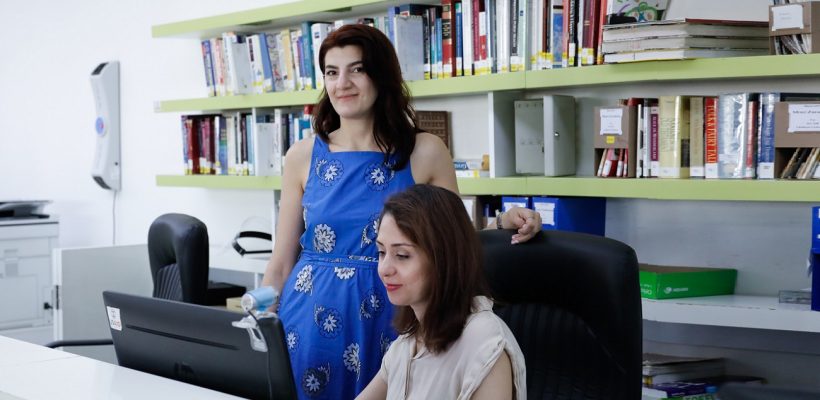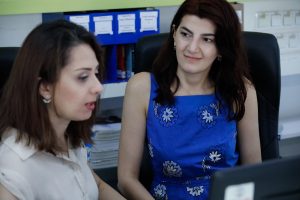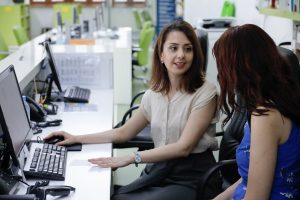
Professional Development Opportunities for Librarians
4 min readAs an integral part of its foundational strategies, the American University of Armenia (AUA) consistently strives to create new opportunities for the professional development of its faculty and staff. Within that framework, two librarians of the AUA AGBU Papazian Library, Tatevik Zargaryan and Araz Margossian, recently completed continuing education courses and workshops in their field. The knowledge and skills they have acquired will greatly benefit the AUA community and also reach the larger group of librarians at other universities in the country.
In July 2021, with support from the professional development Small Grant Program funding of the AMICAL consortium, Tatevik Zargaryan, library systems and e-services librarian, participated in the Designing Game-Based Learning workshop delivered by the Online Learning Consortium. The workshop provided her with the opportunity to learn how to use the storytelling tool Twine and further advance her skills in digital teaching tools, such as storytelling and designing game-based activities.
The AGBU Papazian Library team believes that designing game-based learning activities will be beneficial for the University. As Zargaryan explains, interactive learning experiences give students the opportunity to develop life-long critical thinking skills․ Such activities will equip students with the ability to use their knowledge and skills more proficiently when making decisions. Moreover, game-based learning is rather interactive and student-centered, and very versatile to be applied in all disciplines at AUA. Twine is used for creating the activity and it can be used online and asynchronously.
Zargaryan believes that game-based learning can bring new insights into effective teaching strategies and digital literacy. It can be used in one-shot sessions, or in an entire game-based course. Librarians can use it when a faculty member requests introducing the tool in a very short session and then continue using it with students. Course-integrated activities aim to support enhanced interdepartmental collaboration between the library, IT department, and faculty in developing the activity, and strengthen teacher-student connections when used. Zargaryan and Margossian are currently delivering information literacy training to undergraduate and graduate students at AUA.
The librarians of the AGBU Papazian Library have consistently collaborated with course instructors to help them enhance teaching and learning at AUA, through consultations that span basic introduction to library services, collections, and learning spaces to advanced co-instruction.
“To move the library into the future, we need to be more adaptive to accommodate new applications of technology and be flexible with the latest innovations in learning and research,” remarks Satenik Avakian, AGBU Papazian Library director. “Our team at the library is actively exploring ways to respond to changes by providing access to new technology and encouraging the community to develop new skills.”
Similarly, Araz Margossian, academic support librarian at the AUA AGBU Papazian Library highly recognizes the importance of keeping pace with new technology and continuing learning and individual development. “Thanks to an AUA Professional Development Grant and AMICAL consortium discount, I completed two Library Juice Academy courses on Critical Information Literacy and Fundamentals of Digital Curation in Libraries, Archives and Museums. The courses equipped me with a set of resources and skills that will enable me as an academic support librarian to sharpen my professional skills and provide effective and quality support and services to the academic community at AUA,” she wraps up.
The Critical Information Literacy course gave Margossian insights into critical information literacy and pedagogy to aptly address biases, controlled vocabularies, privileges, and oppressions in scholarly communication and academic publication. She learned how to address these issues through library instruction sessions that are learner-centered and creative, and empower rising researchers and scholars to navigate the research systems and evaluate academic and general sources of information as conscious and responsible information consumers and producers.
In the Fundamentals of Digital Curation in Libraries, Archives, and Museums course, Margossian had the opportunity to study and evaluate sample digital curation programs and discuss case studies tackling topics on security and sustainability considerations when appraising and publishing digital collections online and other ethical and legal issues related to copyright and privacy.
“Students and faculty at AUA navigate and use digital collections and datasets created by others, and indeed many produce such collections themselves in creative and collaborative initiatives, much of which, unfortunately, remain unpublished, invisible, and inaccessible to the public and the academic community,” Margossian elaborates. “Even when initiating projects to organize and publish these digital assets many technical and legal issues impose challenges that demand a new set of digital skills and literacies of the modern researcher/scholar, especially that good curation practices happen at all stages of the digital assets (data) lifecycle and not only when preserving or publishing the collection.”
The library, with its historical role as the curator of information and academic support unit, is uniquely positioned to support and equip the academic community with critical information on digital literacy through guidelines, new modules, and course-embedded activities that help initiate and realize new digital collections. Such professional development opportunities are essential for elevating skills and empowering the librarians to team up for supporting a modern and innovative academic library.
Founded in 1991, the American University of Armenia (AUA) is a private, independent university located in Yerevan, Armenia, affiliated with the University of California, and accredited by the WASC Senior College and University Commission in the United States. AUA provides local and international students with Western-style education through top-quality undergraduate, graduate, and certificate programs, promotes research and innovation, encourages civic engagement and community service, and fosters democratic values.


